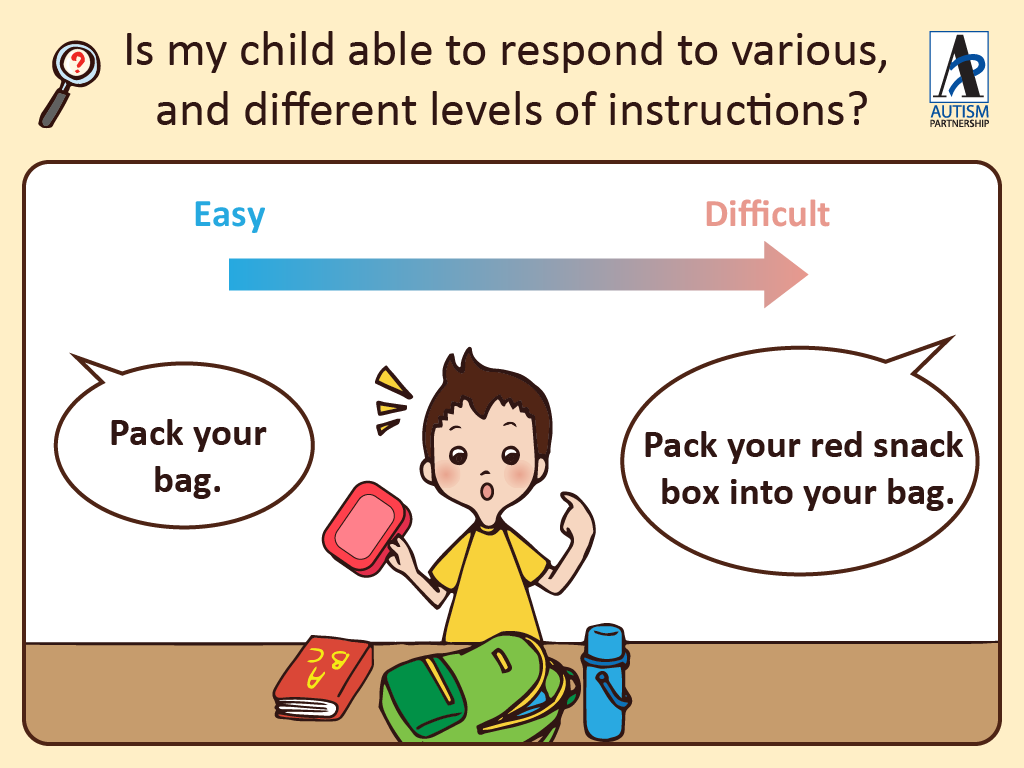Parent’s Question:
My child is now eight years old and studying in Primary 2 in a mainstream school. He can speak, but his social skills and comprehension skills are not very good. I think he’s been sort of lying. For example, he had a PE class in school, but when I ask him if he has had a PE class, he would say no and make up a lot of reasons. Another example is that when I ask him what did he have for lunch at school, he would answer, but none of those food was on the menu.
What should I do?
Autism spectrum disorder (ASD) is a neurodevelopmental condition that causes challenges in an individual’s social communication skills, social interactions and behaviours. Individuals with ASD can also present difficulties with understanding or using spoken language.
It is not uncommon for these challenges to be misunderstood by others. For example, a child who does not understand a question and lacks the ability to ask for help may appear to his/her teacher as not paying attention or perhaps, a deliberate act of defiance. In another (this) situation, when a child is not able to give accurate, or complete, account of his day when asked, he could be easily thought as lying.
However, before we discuss the child’s behaviour (in this case, lying), let’s explore some of the language and cognitive skills needed for the child to recall and answer the questions around his day from his parents.
The ability to understand different types and complexity of instructions helps to build the skill to differentiate different questions. At a beginner’s level, this could be basic instructions such “Pack your bag”. Advance instructions can consist of multiple parts or with different language concepts that include verbs, locations, adjectives, quantities, etc.
| Type of Instruction | Examples |
| Basic Instruction | “Pack your bag.” |
| Instruction with Multiple Parts | “Pack your snack box into your bag.” |
| Instructions with Different Language Concepts | “Pack your red snack box into your bag.” |

These WH questions includes who, what it is, what’s happening, where, why and how. Besides having the ability to discriminate these questions, it is essential for your child to have the ability to answer these questions from a more structured setting (eg. A book, a picture card) to a more natural environment.

The ability to sequence events allow your child to also understand temporal concepts of what comes before and after. This can involve basic sequencing (eg. the ability to understand what comes next) to more advance ability to sequence events that happened earlier.

Having the skill to describe with details allow your child to express what he experienced. This would include other language skills such as the ability to recall, sequencing of events and able to express advance language concepts such as verbs, locations, adjectives, quantities, etc.

Recalling events works on your child’s memory and require your child to remember what happened earlier. In a more advance situation, we may require the child to describe a sequence of event.

Besides the ability to distinguish different events apart, this cognitive skill would also give rise to the ability to understand and respond to a question that involves a specific time and sequencing of events.

The ability for your child to recall what happened to them in the day, and answer questions relating to the events require multiple skills. This can range from basic comprehension to more complex skills that involve cognitive and reasoning skills. When a child acquires strong language skills, it gives the him/her the ability to understand the question, communicate more accurately, and reduces being misunderstood.
In Part 2, I will discuss with you some of the ways we can support children to respond truthfully, or accurately, to us.

It’s natural for parents to compare their child to others, including among those raising a child with ASD. Many parents ask why their child isn’t making the same progress as other children, despite following the same intervention program. While we fully understand these concerns, we strongly recommend that parents avoid comparisons. Each child with autism […]

Choi, a 6-year-old boy, has been attending mainstream school just like his peers. However, he exhibited challenging behaviors in the classroom, such as throwing objects and hurting others. At school, he was often separated from his classmates and unable to participate in their regular activities. His school teachers recommended that Choi’s father seek support from […]

Parents seeking treatment for their children’s Autism Spectrum Disorder (ASD) are faced with an overwhelming number of treatment options. Cutting through the noise to identify Applied Behavior Analysis (ABA) as the most effective treatment can be a difficult task. Unfortunately, even for the parents who have discovered that ABA has the most supporting research, the […]
Please share to let more people learn about ASD and ABA therapy:
AP holds the belief that with quality ABA treatment using the Autism Partnership Method (APM), individuals with autism can reach their fullest potential and achieve the greatest degree of independence and highest quality of life possible.
![]()
All information received will always remain confidential. We will contact you as soon as we review your message. Thanks